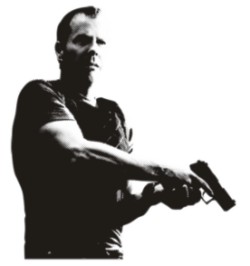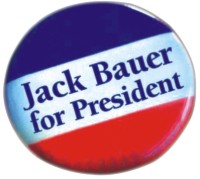Reflections
You Don't Know Jack
The American television series 24 on Fox TV ends this week, but its socio-political legacy will live on as it mapped major flashpoints of a post-9/11 America.
Nader Rahman
24, premiered less than a month after the 9/11 attacks in New York and for many it seemed too real too fast. The reason? It seemed to portray the all too valid threat of international terrorism and duplicity in government that had come to characterise a few previous administrations in America, as well as the widespread doubt over the Bush doctrine. Simply put, it had its finger on the pulse of a generation that grew to distrust the government, became increasingly xenophobic and whose morals were held up to be as precious as gold, but just as malleable.
The programme proved to be revolutionary not just for its seemingly endless plot twists, real time action and split screen time lapses, but because it seemed to bring America's national security fears to the surface and often chose to deal with them in the most politically incorrect way possible.
The lead character Jack Bauer soon came to epitomise mainstream American discourse on issues such as lethal force and torture of enemy combatants. Well let's just say his ideology towards protecting the US was a hybrid of the worst parts of George W. Bush and best of Machiavelli. His 'protect at all costs' mantra that characterised the first few seasons of the show was met by an insecure post-9/11 audience that lapped up his disdain for human rights and the word of the law. In his efforts to enforce the law he often broke it and found a captive audience that willing to egg him on towards the greater good.
In a programme with more twists and turns than the Monaco Grand Prix, there was always a bigger picture that seemed to justify the Jack Bauer's litigious actions. He was always out to save the president or the country from nerve gas, nuclear bombs and terrorists who would blow up anything and in sight. Every thing was justified because in the end Jack Bauer saved more lives than he took, because in the end he was the true American hero, putting his life selflessly on the line for his country.
In those uncertain days, weeks and years after 9/11 Jack Bauer inadvertently came to symbolise the excesses of the Bush administration. Long before they had to seriously deal with 'enhanced interrogation', water boarding and Guantanamo Bay, Jack Bauer managed to make his point on those issues every week on national television. For him and the fictional Counter Terrorism Unit (CTU) he worked for (a sort of mix of the CIA and the NSA with regards to its fictional jurisdiction and it practices) the ends justified the means. He would do what ever it took to root out evil, save America and protect its liberty, the only cost was a moral one, an intangible cost that he was willing to bear any day of the week.
On a national scale Bush and Cheney started their own version of a Jack Bauer styled system of justice. One which the public first accepted, but then read the fine print only to be horrified at its consequences. The translation from small screen to oval office was not easy, but then for Jack Bauer nothing ever is. As the first signs of discontent started to be seen and heard regarding the Bush administration, 24 veered that way as well.
Soon the subplot included corrupt government officials with play-doh morals and a sinister President who would do anything to stay in power to craft what he considered a fitting legacy of his presidency. Hmm, it all began to sound strangely familiar and just when the public and press started to turn on Bush, so did Jack Bauer's superiors in 24. His no holds barred, 'torture reveal all' style soon did not fly with his superiors who tried their best to reign him in. While they were successful at times for the most part he still went about Los Angeles with a lust for taking and torturing lives that were deemed secondary to his mission.
In this part of the series his behaviour is loosely justified by corruption within the government which he tries to fight. While Bush and Cheney were at their worst in the real world it was an easy to accept storyline and one which only ever provided him with a free pass to use human rights laws as toilet paper. While the 67 scenes of torture in the first five seasons may have been intellectually questionable, they certainly made for riveting television, where morality was seemingly redefined every episode.
After years of torturing and killing in the most questionable ways possible, as the series headed into its final stretch again it mapped America's consciousness as Jack Bauer stood before a congressional hearing for his many varied and questionable activities. This was about the same time water boarding and enhanced interrogation made their way into the American lexicon.
It was not the kind of America that cheered Jack Bauer a few years earlier, this was the America that wanted answers, civil liberties, accountability and a closer look into the shenanigans inside the White House. As America changed so did Bauer, but unlike the government he stood to answer his fiercest critics and was prepared to atone for his misdeeds.
24 was not a case of art imitating life, it was a case of art and life being two sides of the same coin. Like a spinning coin both sides had the same value just different images. Jack Bauer was easy to swallow because even though his actions and the plots felt real, we always knew when the credits rolled we would be done with it. The mark the series left on our consciousness was only enhanced by the Bush administrations actions. By the end of the series no (fictional) American government is left unscathed, everyone at the top is viewed as corrupt and that lack of faith in officialdom is a palpable feeling around the US now. From Obama's failed promises, to Wall St, to the oil spill in the Gulf, the US presidency has become a poisoned chalice to which no doubt Jack Bauer added a few drops through a television series that rode the gamut of emotions in a post-9/11 America. 
Having ones favourite television series cancelled is like having a childhood friend move to a different city. At first the pain in unbearable but then even young hearts mend. Before leaving there is always a 'do you remember…' session, where the best and worst parts of friendship and series are discussed at length and then when that conversation has been repeated enough, its time to let go.
Years later the friend will pop up unexpectedly, like a rerun of your favourite show, but something will be different. You will probably reminisce about the good old times, but it just won't be the same. The show and your friend just won't seem as interesting as they were before. Only truly captivating television and great friends remain relevant years after they have left, and 24 is just that kind of a show and Jack Bauer is just that kind of a man. If you haven't seen 24, then you don't know Jack.
Copyright
(R) thedailystar.net 2009 |
